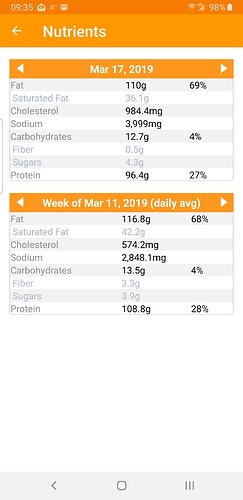@striperseeker
Short Version: In short, there is nothing wrong with your version of “keto” because almost nobody here does the ketogenic diet anyway. Where you might run into trouble is managing calories to an arbitrary target of calorie restriction without knowing what metabolic reaction it’s going to elicit. What you’re doing now is not working, so it’s not an entirely crazy idea to give “eat to satiety” a try for a month or two to see if your results are better.
TLDR Version:
Your version of the ketogenic diet is pretty similar to most folks here with respect to macro composition, so you’re doing just fine. I would guess that less than 1% of people here follow an actual ketogenic diet, as authored by Dr. Russell Wilder of the Mayo Clinic in 1923. It calls for 90% of calories from fat, 6% from protein, and 4% from carb. Nobody does that. Pretty much everybody has their own version. That’s cool because few of us have epilepsy which is what the diet is meant to treat. You’re doing fine!
The dominant version on this forum is one where you limit carbs to 20g, target protein between 1g/kg-2gkg of lean bodyweight, and then eat fat to satiety. Some folks track calories, some don’t, but the calories do not guide the food consumption, they just report on it. You’re pretty much square except for the last point.
It’s an important point though. It sounds like nonsense until you realize that you have no idea how many calories you actually expend every day, and you don’t know how many calories you eat. You don’t know how many calories you expend in a day, because you’ve never had your resting metabolic rate tested. If you used an online calculator, you have an estimate that’s accurate to +/-30%. You also have no idea how much you expend with exercise because you’ve never done a VO2 max test, and you don’t wear a 24 hr heart rate monitor. This gives you an additional +/-10% error range. In short, your Calories Out number has problems.
Calories In has a similar problem. You can’t know with any degree of certainty how many calories you consumed, because in US, food companies can legally understate calories by up to 17%, and many understate by more. The non-processed foods you eat are not sufficiently uniform to be estimated with much better precision. The variation between 2 ribeye’s could be 40% just based on marbling and trimming.
So now you’ve got at 20% estimate problem on the Calories In, and you’ve got 40% estimate problem on your Calories out. Managing to that number is not necessarily going to get good results.
But that’s not the real problem. The real problem is that calorie partitioning is controlled by hormones once they get into your body. Insulin is the major player here. If insulin is elevated, your ability to burn stored fat is impaired. The percentage of calories consumed that you convert to fat is increased. Since you’re 240lbs and 5:11, there is a decent probability that you have insulin resistance and that this is a major problem for you. There are a few dozen other hormones that will similarly bedevil your efforts but that’s too much typing. So let’s just say that you have a hormone problem.
Fortunately, you have a hormone solution. The 2 hormones that interpret this whole complicated mess in a meaningful way are Gherlin and Leptin. These are your satiety hormones. One makes you feel hungry, one makes you feel full. If you listen to them carefully, and do what they tell you, they will by and large leave you alone and so will the other trillion cells involved in your metabolism. If you fight back, you set off a metabolic chain of events like the reduction of resting metabolic rate, increase in cortisol, increased hunger, decreased satiety, and so on until your metabolism succeeds in storing fat. That’s what most people accomplish by using force of will to adhere to an arbitrary calorie target. They lose 15lbs and then gain back 20.
So your choice is really whether or not you will force your metabolism to fight back, reinforcing a vicious cycle, or trust your satiety hormones to slowly guide you down to a healthy body weight. When you realize that your body has 2 million years of practice burning/conserving body fat, and all you have is a spreadsheet, choosing the latter is not as crazy as it sounds!

